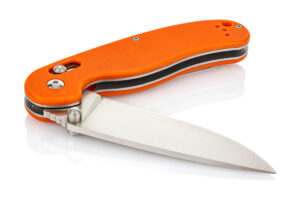
Carrying a knife is becoming a more popular form of self defense in Minnesota and across the US, but because they can be a deadly weapon, it’s imperative that you understand the laws that govern knife possession. In today’s blog, we cover a number of knife-related topics including which knives are legal to carry in Minnesota, which knives can get you in trouble, and the penalties for knife-related crimes in Minnesota.
Minnesota Knife Law FAQs
We’re going to make this an FAQ-styled blog, with some of the most common questions and answers pertaining to knife laws in Minnesota. This should be considered general advice, and remember that local or municipal ordinances may take precedence over some of the following information.
Is it legal to possess a knife in Minnesota?
Yes, you can legally possess any knife in Minnesota other than an automatic knife (aka switchblade). Switchblades are illegal to possess in Minnesota.
Is it legal to conceal carry a knife in Minnesota?
Yes, you can legally conceal carry a knife in Minnesota, so long as it is not a switchblade. Minnesota law states that, other than switchblades, knives can be concealed and carried by individuals so long as you do not possess them with the intent of using them unlawfully. So as long as you are carrying your knife for self defense and not in order to commit a crime, you should be fine. There are exceptions, which we’ll cover in the next section.
Where can’t I carry a knife in Minnesota?
Even though you can carry a concealed knife legally in Minnesota, there are still some places where carrying a knife is outlawed. For example, it is illegal to carry a knife of any length in courthouses, schools and some state buildings. Many cities also place restrictions on the length of blade you can carry in public parks. For example, Ramsey County states that it is “unlawful for any person to…possess or carry in any park, any air gun, bow and arrow, knife with a blade three (3) or more inches in length, slingshot, dart or projectile thrower, or any other dangerous or illegal weapon.”
Conversely, Hennepin County has no specific knife laws on the books, so just know that if you are planning on carrying a concealed knife, it may pay to look up specific regulations based on the city or county you’ll be visiting.
What are the penalties for carrying a knife illegally?
Penalties for illegal knife possession will vary based on the specific law you violated, but in most instances, possession charges will result in misdemeanor or gross misdemeanor charges. These are punishable by up to 90 days in jail and a $1,000 fine for a misdemeanor, and up to a year in jail and fines up to $3,000 for a gross misdemeanor. Illegally possessing a knife in a school, or using the knife in an assault can lead to felony charges, which are even more strict.
What if a student accidentally brings a knife to school?
The case of “In re the WELFARE OF C.R.M., child” helps set the precedent for when a knife is brought to school. In that case, the Minnesota Supreme Court reversed a decision that found C.R.M guilty of bringing a knife to school after the child admitted to having a knife in his coat that was uncovered during a random contraband check while his coat was not on his body. C.R.M. admitted to owning the knife, but said that he forgot it in his pocket after whittling over the weekend. Although the state supreme court acknowledged that by the letter of the statute, C.R.M. had violated the law, he did not do so knowingly, therefore the conviction was thrown out. Known possession, even if you don’t plan to cause harm with it, is a felony-level offense, but unknown possession may allow a student to escape a conviction.
Who should I call if I am facing knife-related crimes in Minnesota?
That would be Appelman Law Firm! You can reach Avery and the team at (952) 224-2277.





